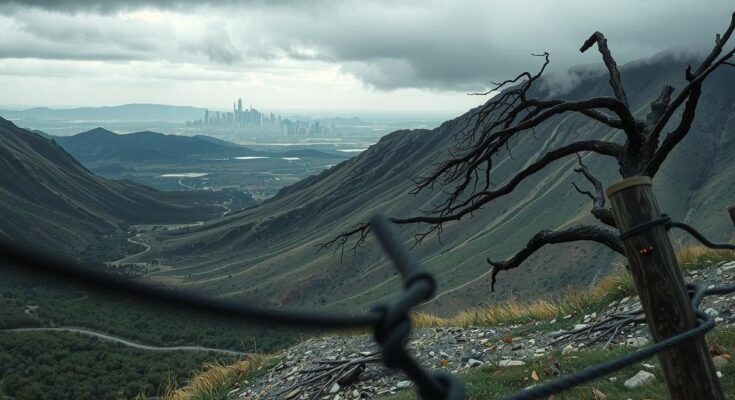Rwandan-backed rebels have taken control of Goma, eastern DR Congo, following violent clashes that left many dead and displaced. Congolese officials condemned the incursion, demanding troop withdrawal. The conflict poses risks of broader regional instability, as humanitarian conditions worsen for residents.
On Wednesday, an armed rebel group backed by Rwanda captured Goma, a crucial city in the eastern Democratic Republic of Congo, leading to days of intense fighting. Residents reported streets filled with casualties and the displacement of thousands. This loss represents a significant blow to the Congolese government, exacerbating the longstanding tensions between Congo and Rwanda, which has previously supported the M23 rebels.
Congolese Foreign Minister Thérèse Kayikwamba Wagner denounced the incursion as a breach of national sovereignty. She stated, “Thousands are trapped in the besieged city of Goma, with restricted access to food, water, electricity, security” and called for an immediate withdrawal of Rwandan troops. Rwanda, however, blamed the Congolese military for violating a ceasefire.
In a statement to the U.N. Security Council, acting U.S. ambassador Dorothy Shea condemned the seizure of Goma, advocating for a ceasefire and urging Rwanda to withdraw its forces. This follows diplomatic efforts from nations such as Kenya, France, and Britain, although outcomes for negotiations remain uncertain amid ongoing violence.
Various reports describe hospitals in Goma being overwhelmed by casualties from the conflict, which has displaced approximately 300,000 individuals. Residents shared accounts of chaos and violence, with limited access to essential resources. Espoir Ngalukiye, a local resident, reported seeing multiple dead bodies amid significant unrest, and described inadequate access to clean water.
Kirenga Tantine, another resident, indicated that many are fleeing towards Rwanda due to the conflict. Furthermore, the U.N. humanitarian coordinator, Bruno Lemarquis, stated that heavy artillery fire has harmed civilians, including newborns and pregnant women. The M23, consisting mainly of Congolese Tutsi individuals, previously took Goma in 2012, illustrating persistent regional instability.
The Democratic Republic of Congo is rich in natural resources, which have historically fueled protracted violence as various armed groups attempt to control these assets. The escalating conflict threatens to involve additional regional players, with Burundi already providing troop support against the rebels. Tensions have also arisen regarding Uganda’s alleged covert backing of the M23, revealing the intricate web of conflicts in the area, compounded by the presence of ISIS-linked factions.
The conflict in eastern Democratic Republic of Congo is rooted in historical tensions, ethnic rivalries, and competition for resource control. The M23, a rebel group composed largely of the Tutsi ethnicity, has been a significant player in the region since its inception. Rwanda’s involvement further complicates the situation, drawing in other neighboring countries and escalating fears of a wider regional conflict. In recent years, international diplomatic efforts have sought to address ongoing violence and humanitarian crises resulting from these ongoing hostilities.
The recent seizure of Goma by Rwandan-backed rebels signifies a profound setback for the Congolese government and heightens regional tensions. As humanitarian conditions continue to deteriorate, calls for ceasefire and withdrawal of troops underscore the urgency of resolving this conflict. The underlying causes of unrest, driven by resource control and ethnic dynamics, highlight the complexity of peace efforts in the region.
Original Source: www.washingtonpost.com




